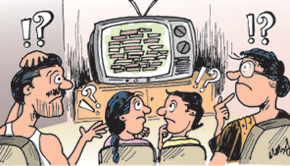Graphic courtesy of Sunday Times.
A purported Broadcast Authority in Sri Lanka that will allegedly have the power to cancel licenses issued to the media have come under criticism from the opposition.
Opposition Tamil National Alliance (TNA) legislator and lawyer M A Sumanthiran told reporters on Wednesday May 31 that the bill on the establishment of this statutory body, if enacted, could violate several fundamental rights including the people’s right to information.
“Everyone knows that there have been many attempts in recent times to impose constraints on people’s right to information. This authority will decide which information is true and whether it can be broadcast,” he said.
The proposed act will also empower the authority to cancel broadcast licenses of those who already hold them, said Sumanthiran.
Read the more including the act : Sri Lanka: Broadcasting Regulatory Commission to be established; License on annual basis only!
The MP said that a similar attempt to bring in such legislation in 1997 was thwarted after then opposition United National Party (UNP) MP Gamnii Athukorala challenged it in the Supreme Court, which determined on May 05 that year that the bill would need a referendum in addition to a two-thirds majority in parliament for it to become law.
“The Supreme Court determined that it went against Article 10 of the Constitution,” said Sumanthiran.
“What we can see is that this violates several fundamental rights, so we strongly oppose this bill.
“It’s not just the media, but the people’s right to information is also challenged by this,” said Sumanthiran.
Main opposition Samagi Jana Balawegaya (SJB) MP Harsha de Silva said the purported bill is undemocratic.
“If these people are given the power to cancel a license – this isn’t objective, it’s subjective, meaning four or five people will decide this,” said the MP.
Authorising a person to censor the content of a broadcast channel would be wholly undemocratic, he said.
“They tried to do this through the Counter Terrorism Act but failed, so it seems they’re now trying to bring it in with this,” said de Silva.
“We see it as a death blow to democracy,” he said, urging the government not to go ahead with it.
“If not, we will oppose it vehemently and fight for the people’s democratic rights,” he said.
Meanwhile, the ruling Sri Lanka Podujana Peramuna (SLPP) said that, while it supports media freedom, the abuse of that freedom cannot be permitted.
SLPP general secretary and MP Sagara Kariyawasam told reporters on Wednesday that some media organisations abused their freedom to make false allegations against the party leadership.
“We are of the firm stand that the media must be independent and that that independence must be facilitated, but if anyone abuses media freedom as a sort of freedom of the wild ass, measures must be taken against that too,” said Kariyawasam.
“We saw how that freedom was enjoyed in the recent past making allegations with no basis. We saw how there were severe allegations made through the media that the Rajapaksas had engaged in thievery,” he said.
The MP claimed that the people voted in the UNP-led Yahapalana government in 2015 to investigate these allegations.
“But that government realised that there wasn’t even a single incident,” he said.
EN (Colombo/May31/2023)
